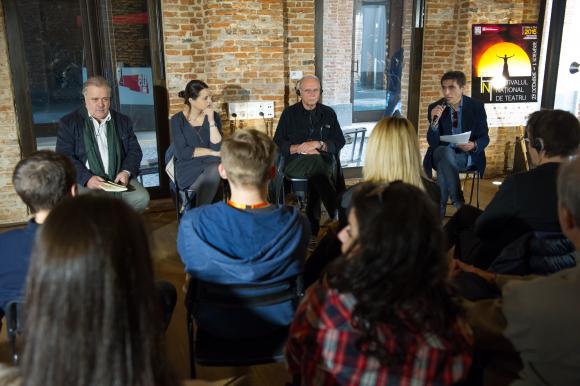de fnt.ro

Astăzi, de la ora 11.30, la Sala Cafenea, din sediul ARCUB Gabroveni, a avut loc o conferință cu titlul “Război. Conflict. Teatru”.
26 October 2015, Articles
October 26th 2015
A conference on the topic of “War. Conflict. Theatre” took place today at the Coffee Shop of ARCUB Gabroveni.
An article by Andrei Crăciun
It is the fourth day of the National Theatre Festival, a grave autumnal day, a suitable weather for conferences, especially for one starting with a rather rhetorical question: “Can theatre bring back harmony among people?”.
I was present among the 34 listeners (including the personnel that was technically supporting the event). Four of the participants were on the side of the speakers: the moderator and the three invitees (left to right): Fabio Tolledi, artistic director of the Astragali Theatre in Lecce, Southern Italy, president of the Italian ITI, Romanian director with a worldwide career, Gianina Cărbunariu, and Alexander Stillmark, president of the ITI Germany.
The conference started with a praising of the efforts of the NTF selector (theatre critic Marina Constantinescu) to choose a series of performances deeply anchored in the immediate reality, one tragically dominated by conflicts, violence and even wars.
In today’s international situation, present is again written down in blood. It’s cold in Bucharest, the sun is deprived of force and in the conference venue details of contemporary history are being recalled, details that turn our times into an era of which the future generations will be ashamed: people fleeing the war in Syria, crossing Europe in the attempt to reach German territory, bullets killing in Ukraine at this very moment, wounds still open after the war in former Yugoslavia, terrible consequences of the ongoing financial and economic global crisis, the town of Nicosia and Cyprus, torn between Greece and Turkey.
Fabio Tolledi discussed more in detail ideas already presented in the interview on our site and pointed out that always and everywhere moments of crisis generated a need for theatre, as the last thing people can cling to in order not to lose their humanity. Toledi mentioned that the Bagdad National Theatre was the last institution abandoned in the most recent war in Irak. In Sarajevo, Bosnia, people kept going to the theatre in times of bombings.
Gianina Cărbunariu recalled the time when she was working on a production in TÎrgu Mureș, 20 years after the events in March 1990. In some respects, she showed an uncompromising point of view: we do live in a time governed by censorship- mainly economic censorship. Cărbunariu militates for a world of differences and observes how Bucharest is a city constantly at war, a permanent battlefield. In Gianina Cărbunariu’s opinion, working with conflict is a duty of the artist.
Alexander Stillmark rounded the discussion saying that we are forced to co- exist with wars, which do represent a feature of capitalism. In the following years we will keep seeing mothers receiving flags in return for their sons dead on the battlefields, lives exchanged for pieces of fabric made in China.
Can theatre bring back harmony among people? Gianina Cărbunariu is skeptical about this. In the news programs, trivia and current violence do co- exist in harmony. But in theatre, they don’t. Theatre will remain a mirror of the conflicts inside us and in this world. Does this mirror bring any change? The answer to this question was not to be found at the coffee shop Gabroveni.
Photo credit: Florin Biolan
October 26th 2015
